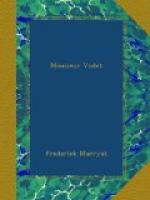By the bye, that twenty-dollar Cairo note’s adventures should be written in gold letters, for it enabled the traveller to eat, sleep, and drink, free of cost, from Louisville to St. Louis, through Indiana and Illinois; any tavern-keeper preferring losing the price of a bed, or of a meal, sooner than run the risk of returning good change for bad money. The note was finally changed in St. Louis for a three-dollar, bank of Springfield, which being yet current, at a discount of four cents to the dollar, enabled the fortunate owner to take his last tumbler of port-wine sangaree before his departure for Texas.
Of course, the lawyer had no remorse of conscience, in swearing that the note had never been his, but the tavern-keeper and two witnesses swore to his having given it, and the poor fellow was condemned to recash and pay expenses. Having not a cent, he was allowed to go, for it so happened that the gaol was not built for such vagabonds, but for the government officers, who had their sleeping apartments in it. This circumstance occasioned it to be remarked by a few commonly honest people of Galveston, that if the gates of the gaol were closed at night, the community would be much improved.
Three days afterwards, a poor captain, from a Boston vessel, was summoned for the very identical bank-note, which he was obliged to pay, though he had never set his foot into the Tremont Hotel.
There is in Galveston a new-invented trade, called “the rag-trade,” which is very profitable. I refer to the purchasing and selling of false bank-notes, which are, as in the lawyer’s case, palmed upon any stranger suspected of having money. On such occasions, the magistrate and the plaintiff share the booty. I may as well here add a fact which is well known in France and the United States. Eight days after the Marquis de Saligny’s (French charge d’affaires) arrival in Houston, he was summoned before a magistrate, and upon the oaths of the parties, found guilty of having passed seven hundred dollars in false notes to a land speculator. He paid the money, but as he never had had in his possession any money, except French gold and notes of the Banque de France, he complained to his government; and this specimen of Texan honesty was the principal cause why the banker (Lafitte) suddenly broke the arrangement he had entered into with General Hamilton (charge d’affaires from Texas to England and France) for a loan of seven millions of dollars.
CHAPTER XXVIII.
We had now entered a tract of land similar to that which we had travelled over when on our route from the Wakoes to the Comanches. The prairie was often intersected by chasms, the bottoms of which were perfectly dry, so that we could procure water but once every twenty-four hours, and that, too often so hot and so muddy, that even our poor horses would not drink it freely. They had, however, the advantage over us in point of feeding, for the grass was sweet and tender, and moistened during night by the heavy dews; as for ourselves, we were beginning to starve in earnest.




